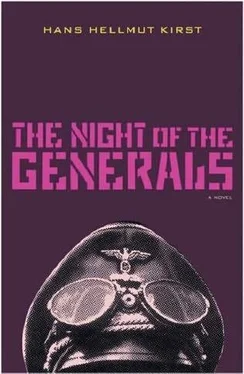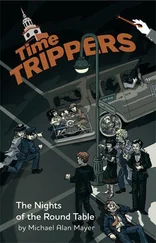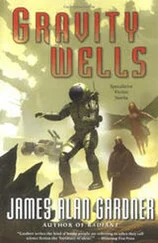“Out of the question!” exclaimed Kraussnick. “If we’re going to have cannon they’d better not be Polish ones. And garlanded with flowers, too! That’s all we need!”
“You’re a very alert young man,” Frau Wilhelmine told Hartmann, “and obviously not without talent. I leave it entirely to you to find a suitable programme for this evening’s recital. When you’ve done so, come and report to me. Would you be so kind? I’m only expressing a wish, of course, but I know you’ll do me this little favour.” She smiled benignly. “Good, then I look forward to seeing you later.”
“Promenade Square, south side!” Major Grau called to his driver.
As he spoke the sun broke through the clouds, dazzling him a little. He leant back in his seat and bunked at the road ahead. “Are you armed?” he asked.
“Of course, sir.”
“We’re on our way to see General Tanz,” said Grau affably.
The car swept through the almost empty streets of Warsaw, its engine humming like a swarm of bees. Glancing skywards, Grau saw that the sun had disappeared behind the clouds again. They looked like a thin pall of smoke, and for some reason he was vividly reminded of the fact that he had gained his first real success as a policeman in the old days by solving a case of arson.
“They’ve sealed off the approaches to the square,” announced the driver.
Major Grau emerged from his reverie with a start. He now saw what had been apparent to his driver for some time. Fighting units were deployed everywhere, dressed in mottled grey-brown-green denims and equipped with small arms. An oppressive silence enveloped them. Hardly anyone spoke, and no one spoke loudly. They stood there like a herd of cattle waiting for someone to open a gate.
“Men from Tanz’s division,” said the driver.
“Some exercise, probably,” said Major Grau. “When they’re not in action they’re training and when they’re not training they’re asleep. Take no notice, the regulations don’t apply to us.”
Grau’s expression did not change. It was as though he merely registered what was going on round him but was not particularly interested or impressed by it.
“Halt!” cried a clear, incisive voice. “No vehicles beyond this point.”
A tanned, hard-bitten face appeared at the car window, half obscured by a jutting steel helmet. Dour determination was written in the pale blue eyes that stared into Grau’s and in the grim slit of a mouth beneath. Any obstacle erected by Tanz had to be dislodged by force.
Grau attached no importance to complications of this sort. He calmly got out of the car and completed the hundred odd yards that separated him from the south side of the square on foot. There he caught sight of General Tanz, a powerful figure despite his rapier-like build, standing aloof from the men who surrounded him.
Looking round for Sandauer, Grau found him leaning against an armoured scout car some distance to the General’s rear. He was not examining the map in his hand but appeared to be lost in a sort of expectant day-dream.
The same applied to the General himself, except that he looked incomparably more impressive. Sandauer stared at nothing: the General gazed into infinity. A war correspondent attached to the division was improving the shining hour by taking a few photographs while the General stood there motionless. A better contemporary subject for the camera could hardly have been imagined.
“Phase One,” said the General.
The General’s A. D. C. transmitted this order to Sandauer, who straightened up and said: “Away we go.” These words, uttered in much the tone of a housewife buying a pound of sugar, were addressed to the wireless operator who sat waiting in the scout car.
“I have an appointment with the General,” said Grau, “but I don’t want to disturb him.”
“It’s impossible to disturb the General if he doesn’t intend to be disturbed.” Sandauer preserved his schoolmasterly demeanour whatever the circumstances. “But you’re quite at liberty to approach him. He’s expecting you.”
Grau went over to the General and made his presence known. Tanz seemed to be wrapped in a shroud of silence, so much so that Grau could almost detect a faint odour of decay.
The General continued to stare fixedly ahead, and it was impossible to tell whether he had heard Grau or not. Eventually he said: “Another few minutes, Grau. It’s almost time.”
The minutes ticked by and nothing in particular happened—nothing, that is to say, which seemed to account for Tanz’s attitude of tense expectancy. The fronts of the houses looked flattened, like a dingy stage-set, the tightly shut windows like clouded spectacle lenses, the trees like the skeletal remains of huge cadavers.
Small groups of men moved almost noiselessly along the walls and then froze like statues. A grinding roar came suddenly from a neighbouring street as tanks crawled into position.
Tanz’s face had become a bronze mask, his cheek muscles prominent as whipcord. His slender but powerful hands caressed his sub-machine-gun like those of a lover fondling the neck of his beloved.
The first shot rang out, followed immediately afterwards by the explosive crump of a bundle of hand-grenades. Within what seemed like a split second, the scene changed. The brooding stillness gave way to a roaring, boiling torrent of sound, and pin-points of flame began to flicker like lights darting across the console of an electronic brain. Thin wisps of smoke wreathed their way into the sky as though the city’s inhabitants were puffing at a myriad cigars.
Tanz’s features relaxed into an austere smile, a strange rictus which seemed to grow more pronounced as bullets began to patter round him like hail-stones. A sudden shaking sound came from somewhere near by, then the dull thump of a body hitting the ground. Shortly afterwards a second soldier slumped to the pavement. General Tanz did not move.
“All according to plan,” said Sandauer a moment later.
The General gave an almost imperceptible nod, then turned his head as if unwilling to deprive his faithful G.S.O.1 of an appreciative smile.
“Good,” Tanz said contentedly. “And now Major Grau can put his questions.”
“He seems to have abandoned the idea for the time being,” said Sandauer.
Tanz looked contemptuous. “What do you mean? Has the fellow wet his pants or something?”
“I don’t think so, sir.” Sandauer forced himself to meet the General’s searching gaze with equanimity. “He merely took his leave.”
“Without saying anything?”
“He said something, sir, but I didn’t catch it.” Sandauer lied with a good conscience. He couldn’t possibly tell the General what he had heard or the world would have fallen about his ears and buried him. Major Grau’s quite audible comment had been: “Not even a subnormal human being could be expected to watch an idiotic display like this of his own free will.”
Though intended as a brilliant social occasion, the G.O.C.’s proposed reception—complete with Chopin recital—threatened to become a fiasco of the first order.
The G.O.C. himself was detained by the necessity for making what were described as “momentous decisions", which automatically meant that his Chief of Staff, General Kahlen-berge, was also delayed. General Tanz was still at large somewhere in the city. When the windows were open, the martial din made by his embattled division drifted in. Consequently, the windows were kept shut.
The order to close the windows issued from Frau Wilhelmine, who continued to supervise arrangements and played the part of sole host, performing the former function with vigour and the latter with dignity.
Once the first few uncomfortable minutes had been overcome the atmosphere took on a comparatively festive note, thanks mainly to the efforts of that seasoned entertainer Captain Kraussnick. His method was admirably simple. Instead of greeting the guests with a glass of port or vermouth, as had been planned, he enterprisingly took a short cut and plied them with hard liquor—chartreuse for the ladies, cognac and kirsch for the gentlemen—in wine glasses. It was hardly surprising if the room was quickly pervaded by a glow of intimacy.
Читать дальше












